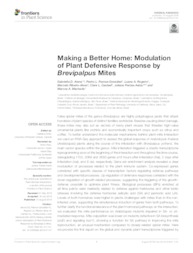Making a better home: modulation of plant defensive response by brevipalpus mites.
Making a better home: modulation of plant defensive response by brevipalpus mites.
Autoria: ARENA, G. D.; RAMOS-GONZÁLEZ, P. L.; ROGERIO, L. A.; RIBEIRO-ALVES, M.; CASTEEL, C. L.; ASTUA, J. de F.; MACHADO, M. A.
Resumo: False-spider mites of the genus Brevipalpus are highly polyphagous pests that attack hundreds of plant species of distinct families worldwide. Besides causing direct damage, these mites may also act as vectors of many plant viruses that threaten high-value ornamental plants like orchids and economically important crops such as citrus and coffee. To better understand the molecular mechanisms behind plant-mite interaction we used an RNA-Seq approach to assess the global response of Arabidopsis thaliana (Arabidopsis) plants along the course of the infestation with Brevipalpus yothersi, the main vector species within the genus. Mite infestation triggered a drastic transcriptome reprogramming soon at the beginning of the interaction and throughout the time course, deregulating 1755, 3069 and 2680 genes at 6 hours after infestation (hai), 2 days after infestation (dai), and 6 dai, respectively. Gene set enrichment analysis revealed a clear modulation of processes related to the plant immune system. Co-expressed genes correlated with specific classes of transcription factors regulating defense pathways and developmental processes. Up-regulation of defensive responses correlated with the down-regulation of growth-related processes, suggesting the triggering of the growthdefense crosstalk to optimize plant fitness. Biological processes (BPs) enriched at all time points were markedly related to defense against herbivores and other biotic stresses involving the defense hormones salicylic acid (SA) and jasmonic acid (JA). Levels of both hormones were higher in plants challenged with mites than in the noninfested ones, supporting the simultaneous induction of genes from both pathways. To further clarify the functional relevance of the plant hormonal pathways on the interaction, we evaluated the mite performance on Arabidopsis mutants impaired in SA- or JAmediated response. Mite oviposition was lower on mutants defective in SA biosynthesis (sid2) and signaling (npr1), showing a function for SA pathway in improving the mite reproduction, an unusual mechanism compared to closely-related spider mites. Here we provide the first report on the global and dynamic plant transcriptome triggered by Brevipalpus feeding, extending our knowledge on plant-mite interaction. Furthermore, our results suggest that Brevipalpus mites manipulate the plant defensive response to render the plant more susceptible to their colonization by inducing the SA-mediated pathway.
Ano de publicação: 2018
Tipo de publicação: Artigo de periódico
Unidade: Embrapa Mandioca e Fruticultura
Palavras-chave: Herbivores, Jasmonic acid, Plant hormones, Salicylic acid
Observações
1 - Por padrão são exibidas publicações dos últimos 20 anos. Para encontrar publicações mais antigas, configure o filtro ano de publicação, colocando o ano a partir do qual você deseja encontrar publicações. O filtro está na coluna da esquerda na busca acima.
2 - Para ler algumas publicações da Embrapa (apenas as que estão em formato ePub), é necessário ter, no celular ou computador, um desses softwares gratuitos. Sistemas Android: Google Play Livros; IOS: iBooks; Windows e Linux: software Calibre.
Acesse outras publicações
Acesse a Base de Dados da Pesquisa Agropecuária (BDPA) para consultar o acervo completo das bibliotecas da Embrapa.

